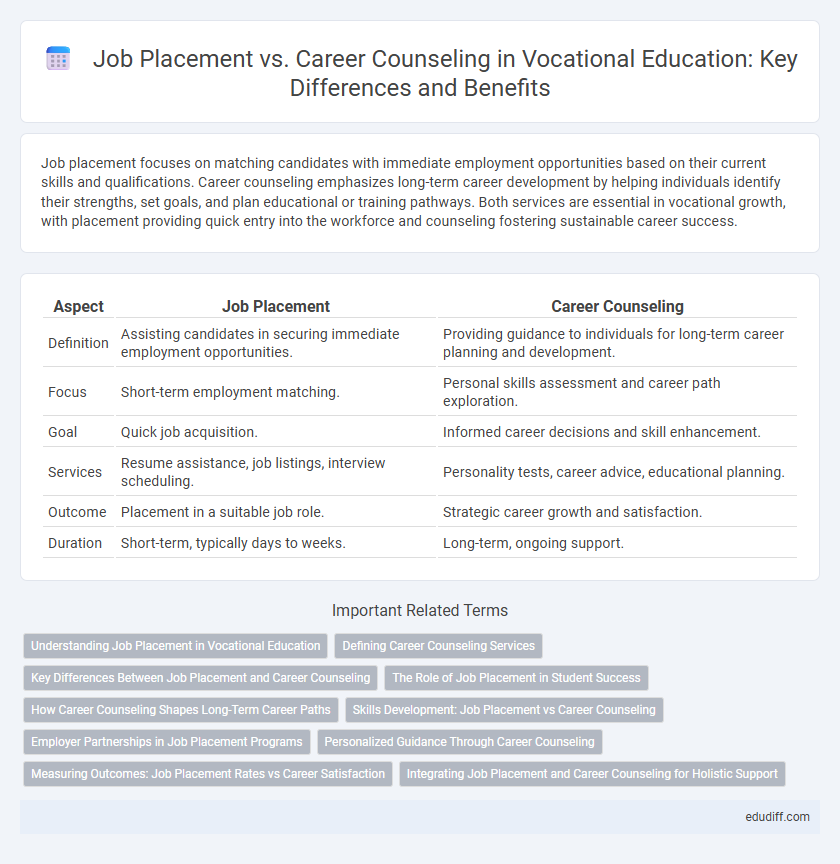Job placement focuses on matching candidates with immediate employment opportunities based on their current skills and qualifications. Career counseling emphasizes long-term career development by helping individuals identify their strengths, set goals, and plan educational or training pathways. Both services are essential in vocational growth, with placement providing quick entry into the workforce and counseling fostering sustainable career success.
Table of Comparison
| Aspect | Job Placement | Career Counseling |
|---|---|---|
| Definition | Assisting candidates in securing immediate employment opportunities. | Providing guidance to individuals for long-term career planning and development. |
| Focus | Short-term employment matching. | Personal skills assessment and career path exploration. |
| Goal | Quick job acquisition. | Informed career decisions and skill enhancement. |
| Services | Resume assistance, job listings, interview scheduling. | Personality tests, career advice, educational planning. |
| Outcome | Placement in a suitable job role. | Strategic career growth and satisfaction. |
| Duration | Short-term, typically days to weeks. | Long-term, ongoing support. |
Understanding Job Placement in Vocational Education
Job placement in vocational education focuses on connecting students directly with employers to secure employment opportunities aligned with their acquired skills. It involves practical support such as resume building, interview preparation, and networking within specific industries to facilitate a smooth transition from training to work. Understanding job placement emphasizes immediate employment outcomes and tangible career entry points compared to the broader, more guidance-oriented approach of career counseling.
Defining Career Counseling Services
Career counseling services provide personalized guidance to individuals seeking to understand their skills, interests, and career options, enabling informed decisions about long-term professional goals. These services include assessments, exploration of career paths, and development of strategies for education and skill acquisition. Unlike job placement, career counseling focuses on holistic career development rather than immediate employment solutions.
Key Differences Between Job Placement and Career Counseling
Job placement focuses on matching candidates with available job openings based on current skills and immediate employment needs, emphasizing short-term job acquisition. Career counseling involves guiding individuals through long-term career planning, skill development, and exploring career paths to align with personal interests and market trends. Key differences lie in job placement's tactical approach to employment and career counseling's strategic focus on sustainable career growth.
The Role of Job Placement in Student Success
Job placement plays a crucial role in student success by directly connecting graduates with employment opportunities aligned to their vocational skills and training. Effective job placement services reduce the gap between education and employment, enhancing students' workforce readiness and increasing their chances of sustainable career growth. By facilitating internships, apprenticeships, and employer partnerships, job placement boosts student confidence and professional networks essential for long-term success.
How Career Counseling Shapes Long-Term Career Paths
Career counseling provides tailored guidance that aligns individuals' strengths, interests, and market trends with potential career paths, fostering sustainable professional growth. Unlike job placement, which addresses immediate employment needs, career counseling emphasizes long-term development through skill assessment, goal setting, and continuous support. This strategic approach enhances adaptability and job satisfaction, ultimately leading to more fulfilling and resilient careers.
Skills Development: Job Placement vs Career Counseling
Job Placement primarily focuses on immediate employment by matching candidates with available job opportunities, emphasizing practical skills relevant to specific roles. Career Counseling, on the other hand, prioritizes long-term skills development, helping individuals identify strengths, set career goals, and acquire competencies that enhance adaptability and growth across various industries. Effective vocational programs integrate both approaches to balance short-term job attainment with sustainable career progression through targeted skills development.
Employer Partnerships in Job Placement Programs
Employer partnerships in job placement programs enhance direct hiring opportunities by aligning vocational training with industry needs, ensuring graduates possess relevant skills. These collaborations facilitate customized internship and apprenticeship placements, improving workforce readiness and job retention rates. By integrating employer feedback, programs continuously adapt curricula to meet evolving labor market demands, optimizing employment outcomes across sectors.
Personalized Guidance Through Career Counseling
Career counseling offers personalized guidance by assessing an individual's strengths, interests, and career goals to create tailored development plans. Unlike general job placement services that match candidates to immediate openings, career counseling fosters long-term career growth and skill enhancement. This strategic, individualized approach increases the likelihood of sustained professional success and job satisfaction.
Measuring Outcomes: Job Placement Rates vs Career Satisfaction
Job placement rates provide quantitative data on how many individuals secure employment shortly after completing vocational programs, serving as a direct measure of immediate program effectiveness. In contrast, career counseling focuses on long-term career satisfaction, assessing whether individuals find fulfilling and sustainable career paths aligned with their interests and skills. Measuring both metrics is essential for evaluating the comprehensive impact of vocational training on employment success and personal career fulfillment.
Integrating Job Placement and Career Counseling for Holistic Support
Integrating job placement and career counseling provides a holistic approach that enhances employability by combining practical job search assistance with personalized career guidance. This synergy supports individuals in aligning their skills and interests with market demands, facilitating long-term career growth and job satisfaction. Effective integration involves coordinated services, continuous feedback, and tailored development plans that address both immediate employment needs and future career aspirations.
Job Placement vs Career Counseling Infographic

 edudiff.com
edudiff.com